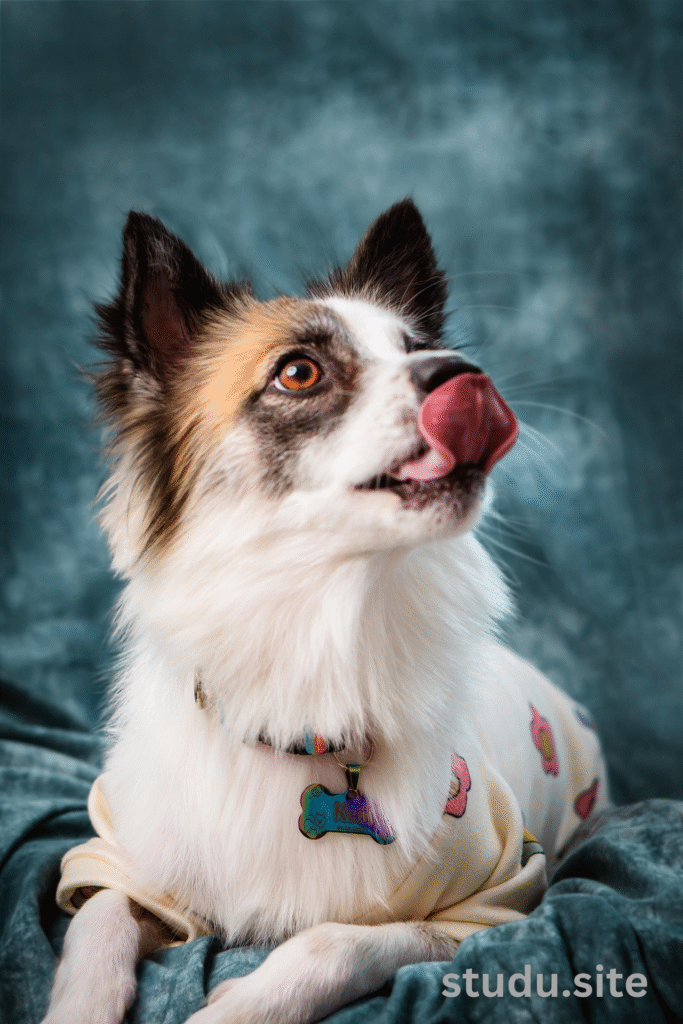Introduction: Why Do Dogs Lick Their Paws?
Have you ever caught your dog repeatedly licking their paws and wondered, Why do dogs lick their paws? This common behavior can range from normal grooming to a sign of underlying health or behavioral issues. While occasional paw licking is natural, excessive or persistent licking may indicate allergies, injuries, infections, or even stress. As a pet owner, understanding the reasons behind this habit is key to keeping your dog healthy and comfortable. This article discusses the reasons behind paw licking, how to know when to worry, and effective remedies to assist your pet, keeping their paws happy and healthy.

Is Paw Licking Normal for Dogs?
Licking paws is a normal behavior for dogs as part of their natural grooming process, just like a cat grooms itself. Licking also serves to clear dirt, debris, or tiny pieces of material caught between their toes or paw pads. It’s also a means by which dogs can calm minor irritations or chill out, since their paws have sweat glands. But if frequent, intense licking of the paws results in redness, swelling, or hair loss, then it’s time to dig further. The American Kennel Club (AKC) says that frequent licking of the paws is one of the leading signs pet owners should watch for, as it typically indicates an issue.
Most Common Reasons Why Dogs Lick Their Paws
1. Allergies
Allergies are one of the main reasons why dogs lick their paws. These can range from:
Environmental Allergies: Pollen, grass, dust mites, or mold can irritate a dog’s paws, particularly in breeds such as Labrador Retrievers or Bulldogs.
Food Allergies: Allergies to foods such as chicken, beef, or grains can be exhibited as paw licking with accompanying ear infections or rashes.
Contact Allergies: Chemicals used in lawn treatments, cleaners, or de-icing salts will irritate.
Symptoms: Red, inflamed paws, chewing on toes, or periodic licking patterns.
Solution: Allergy testing by a vet, hypoallergenic diets, or using paw wipes after walking to eliminate allergens.
2. Skin Infections or Parasites
Bacterial or yeast infection, usually prompted by water trapped in paw fur, may lead to excessive licking. Fleas, ticks, or mites are also pester paws.
Yeast Infections: Found in hot climates or breeds with heavy coats, such as German Shepherds, with musty odor and brown discoloration.
Fleas or Mites: Pests bring about itching that results from scratch and lick or chew excessively.
Symptoms: Redness, odor, crusty skin, or parasites are apparent.
Solution: Use vet-prescribed medicated shampoos, antifungal treatments, or flea preventatives like Frontline.
3. Injuries or Pain
Paw licking can signal physical discomfort from:
Cuts or Abrasions: Sharp objects, hot pavement, or rough terrain can injure paw pads.
Foreign Objects: Thorns, splinters, or grass seeds stuck between toes cause irritation.
Joint Pain: Arthritis or ligament issues in older dogs may prompt licking to soothe discomfort.
Symptoms: Limping, swelling, or visible wounds.
Solution: Moisturize paws frequently, wash wounds with antiseptic, and see a vet for ongoing pain or objects embedded in the skin.
4. Dry or Irritated Skin
Dry paw pads or skin, particularly during cold weather or dry climates, cause licking as dogs attempt to lubricate their paws. Harsh weather, low humidity, or excessive bathing with drying shampoos contribute to the problem.
Symptoms: Cracked pads, flaking skin, or rough texture.
Solution: Use vet-prescribed paw balms such as Musher’s Secret, keep humidifiers running indoors, and restrict baths to dog-safe, moisturizing shampoos.
5. Anxiety or Boredom
Psychological issues such as stress or boredom may cause compulsive licking of the paws, much like human nail biting. Typical triggers are:
Separation Anxiety: Dogs might lick when left alone, particularly high-energy dogs such as Border Collies.
Lack of Stimulation: Dogs that lack stimulation, are under-exercised, or bored will develop habits of obsession.
Environmental Stress: Transitions such as moving or new pets may trigger licking.
Symptoms: Worsening licking during stressful situations, accompanied by pacing or whining.
Solution: Add exercise, offer puzzle toys, or visit a vet for anti-anxiety medication such as calming supplements or behavior modification.
6. Hormonal Imbalances
Medical conditions such as hypothyroidism or Cushing’s disease can result in skin alterations, triggering paw licking. Such conditions are seen more in aging dogs or breeds such as Golden Retrievers.
Symptoms: Thinning coat, weight gain, or lethargy in addition to licking.
Solution: Blood tests and meds prescribed by the vet can regulate hormonal imbalance.
When to Worry About Paw Licking
Every now and again is normal, but continued or compulsive licking is a cause for concern. Look out for these warning signs:
-
Red, raw, or inflamed paws
-
Hair loss or brown discoloration (due to saliva)
-
Foul smell or discharge
-
Limping or unwillingness to walk
-
Licking that interferes with daily activities such as eating or play
If they continue for longer than a few days, see a veterinarian. If paw licking is not treated, it can result in lick granulomas—swollen, infected sores that are difficult to heal.
How to Prevent Excessive Paw Licking
Treating paw licking will vary depending on what is causing it, but here are some general steps to assist your dog:
-
Inspect Paws on a Regular Basis: Look for cuts, foreign bodies, or redness. Wash paws with a damp cloth after walking to get rid of irritants.
-
Wear Protective Gear: Dog booties keep paws safe from allergens, scorching sidewalks, or toxic chemicals, particularly for sensitive-padded breeds such as Chihuahuas.
-
Preserve Grooming: Clip hair between toes to prevent moisture from accumulating, and shorten nails to prevent irritation.
-
Change to a Hypoallergenic Diet: In case of suspected food allergy, feed limited-ingredient diets such as salmon or duck-based formulas for 8–12 weeks.
-
Provide Mental Stimulation: Engage in puzzle toys, training sessions, or a daily stroll to alleviate boredom or anxiety.
-
Use Anti-Lick Aids: Bitter sprays or Elizabethan collars (cones) will discourage licking while resolving the underlying cause.
-
Visit a Vet: For chronic licking, a vet can prescribe allergy shots, antibiotics, or behavioral therapy.
Home Remedies for Mild Paw Licking
For slight irritation, try these vet-sanctioned home remedies:
-
Epsom Salt Soak: Mix 1 tablespoon of Epsom salt in a gallon of warm water and soak paws for 5–10 minutes to relieve irritation.
-
Coconut Oil: Use a thin layer to dry-pads moisturize but use sparingly to prevent greasiness.
-
Oatmeal Baths: Bath using colloidal oatmeal shampoos to soothe itchy skin.
-
Apple Cider Vinegar: Mix 1:1 with water and apply to paws to fight mild yeast, but steer clear of open wounds.
Always test remedies on a small area first and see a vet if symptoms get worse.
Preventing Paw Licking in the Future
To keep paw licking at bay:
-
Regular Exercise: Provide 30–60 minutes of every day activity, suited to your dog’s age and breed.
-
Allergen Control: Clean paws after outdoor activities and air out indoor spaces using air purifiers to minimize allergens.
-
Healthy Diet: Provide high-quality, vet-approved food for skin and immune health.
-
Regular Vet Visits: Checkups once a year detect problems such as allergies or hormonal imbalances early.
-
Stress Management: Establish a peaceful home life with routine and safe havens.
Paw Licking Myths That Don’t Hold Up
Myth: Paw licking is always benign grooming.
Fact: Over-licking usually indicates health or behavioral issues.
Myth: All dogs lick their paws for the same reason.
Fact: Causes range from allergies to anxiety, and need individual solutions.
Myth: Home remedies cure all paw licking.
Fact: Serious problems such as infection require veterinary attention.
Why Paw Licking Matters
Paw licking is more than an odd quirk—it can affect your dog’s well-being. If left unaddressed, underlying problems can cause chronic pain, infection, or behavioral issues, particularly in breeds that are more prone to skin problems such as French Bulldogs or Poodles. By finding the root cause early, you can avoid discomfort and build a deeper connection with your pet.
Conclusion
So, why do dogs lick their paws? From allergies and injuries to anxiety and boredom, this behavior has many causes, ranging from harmless to concerning. By monitoring your dog’s habits, addressing underlying issues, and seeking veterinary advice when needed, you can ensure their paws stay healthy and comfortable. Whether it’s a quick paw wipe or a vet visit, taking action shows your love for your furry friend. Did you catch your dog licking their paws? Leave your experience or question in the comments!
